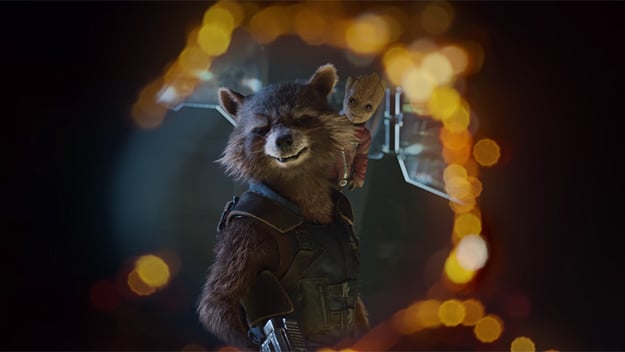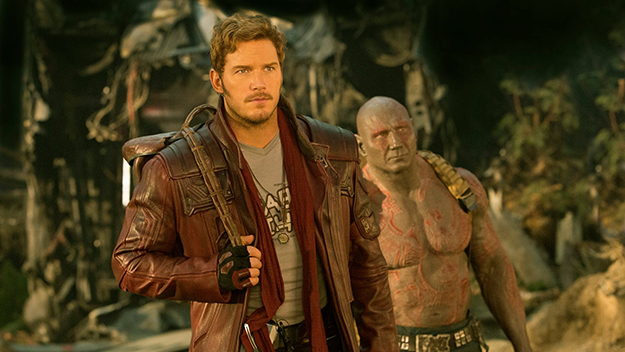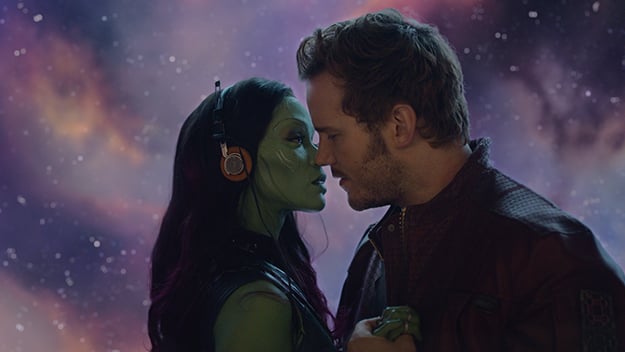Deep Focus: Guardians of the Galaxy, Vol. 2

Why should every manner of director hanker to make movies that are “character-driven”? What a terrible phrase that is! It makes drama feel like heavy labor. Nearly every interview with writer-director James Gunn hails him for turning Guardians of the Galaxy into a “character-driven” sequel. But who goes to see a Guardians of the Galaxy movie for deeply motivated characters? Gunn has cited Mike Hodges’s giddily beautiful Flash Gordon (1980) as a crucial inspiration, but I wouldn’t say Flash Gordon is packed with character. I love Flash Gordon because it’s like a teenage dream date—it’s got great looks and a great personality. And personality is not always about character; it’s more about charm and spirit and attitude.
I’m no big fan of the first Guardians of the Galaxy. It was a vain attempt to make a comic epic out of a gargantuan collection of doodles. I could see, though, why audiences went for its array of impudent cosmic graffiti and offhand gimmicks, notably its use of feel-good 1970s rock as the counterpoint to apocalyptic action. It had the virtue of being frivolous in an increasingly self-serious universe of comic-book movies and had the piquancy of a slate of novelty acts. Unfortunately, Guardians of the Galaxy Vol. 2 illustrates the futility of visiting novelty acts a second time and hoping for the same zing.
Vol. 2 testifies to the folly of treating cartoonish action figures as flesh-and-blood protagonists who require detailed origin stories and psychological resolution. Gunn’s raffish, misfit band of adventurers are all back—Walkman-wielding soldier of fortune Peter Quill, aka Star-Lord (Chris Pratt), green-skinned reformed assassin Gamora (Zoe Saldana), vengeful, big-hearted brute Drax the Destroyer (Dave Bautista), and bounty hunter Rocket (voice of Bradley Cooper), a talking raccoon (the result of cruel genetic and biological experiments) who’s become a bold tinkerer and planner and a ruthless practical joker. The first film paired Rocket with Groot (voice of Vin Diesel), a sentient walking tree, who served as Rocket’s partner-in-crime despite a vocabulary limited to “I am Groot.” In Vol. 2, only Groot renews his novelty: Having been reduced to a sprig at the end of the first film, he’s now “Baby Groot,” a stump with hilarious-adorable Keane eyes and a yen to dance whenever he hears a catchy beat, even though his friends might be body-slamming a space monster a few steps away.

Astonishingly, Gunn has smudged or stripped the trademarks from the rest of the characters. For example, Drax’s ultra-literal mind was his comic signature in the first Guardians. Rocket warned Quill, “Metaphors are gonna go right over his head,” and Drax protested, “My reflexes are too fast. I would catch it.” In Vol. 2, his main source of humor is his boundless crudeness, right from the moment, early on, when he brags about (I kid you not) his “famously large turds.” If the whole idea of a fiercely competitive talking raccoon initially generated laughs because it was one big wink at the audience, in the new film Rocket’s key scenes depend on him actually winking at his friends and the audience, too. In Vol. 1, Pratt, the former Parks and Recreation star, showed off his sitcom chops by developing some odd-couple chemistry with Saldana’s sleek Gamora. Though Pratt was admirably buffed-up, Quill was lovably bumptious. In Vol. 2 he punches above his weight class. He insists that Quill and Gamora have the “unstated thing” that Sam and Diane had in Cheers. Pratt and Saldana try to conjure it but can’t.
Most likely Gunn couldn’t keep his mind on detonating fresh gags and brewing lighthearted esprit de corps because images of The Empire Strike Back kept dancing in his head. Rather than deepen the movie, Gunn’s vision merely thickens it. Quill always had daddy issues: all he knew about his father was that he wasn’t from Missouri. Vol. 2 hinges on Quill finally meeting his dad, who turns out to be a god named Ego. No matter how divine Ego’s explanations, Quill can’t stop sulking about Ego abandoning his mother and ordering the blue-skinned, jagged-toothed pirate Yondu (Michael Rooker) to drag Quill off of Earth and into a life of intergalactic buccaneering. For a while, Kurt Russell generates enough bonhomie for both of them as Ego. He plays the god with a starburst of a twinkle in his eye, so at first it’s fun to see Quill get to know the man he’d always imagined would look and sound like David Hasselhoff.
Gunn can’t keep the good times rolling in Vol. 2: he’s engineered the plot to revolve around a grisly cosmic double-cross. The whole movie is designed to question biological bonds and celebrate friends as the family you choose. That’s the theme that Gunn feels he must struggle with, not just in Quill’s story, but in Gamora’s, too. Both she and her nemesis adopted-sister Nebula (Karen Gillan) hate their tyrant-father Thanos, but Nebula is still ready to fight Gamora to the death because Thanos always liked her best. (To be fair, because of the constant gladiatorial testing Thanos put them through, Nebula has so many artificial limbs and organs that only her ferocious personality seems to be entirely her own.) The movie riffs self-consciously on arrested development. Even Rocket and Yondu bond over their tortured adolescence.

The new insectoid character Mantis (Pom Klementieff), with her tremulous black eyes and shivering antennae, shares a promising dual shtick when she bonds with Drax: she’s supernaturally sensitive and can feel other characters’ emotions by touching them. He’s fundamentally insensitive and keeps telling her how ugly she is. But Gunn can’t resist lacing Mantis with pathos. Ego adopted her as a space waif, so she hesitates to reveal the god’s dark secrets. Only Baby Groot creates some undiluted crazy-comic pleasure, perhaps because he’s the only one with an uncomplicated childhood. He’s simply a twig off the old tree.
The first Guardian film had “the Orb” as its MacGuffin—as Quill says, an item with a Lost Ark, Maltese Falcon vibe to it—and this film has “Anulax batteries,” which are more forgettable. This movie flails and flops as Gunn tries to hand each Guardian a moment of pop-rock truth. Gunn sets up a natural antagonism between his scruffy band of space saviors and a perfectionist planet and race called “The Sovereign,” led by the towering, hypnotic high priestess Ayesha (Elizabeth Debicki). He rarely mines that slob vs. snob conflict for farcical gold because he’s too busy cross-cutting among the agonies of Quill & Ego & Gamora & Nebula & Rocket & Yondu & Mantis. Visually, the movie is all over the map. In the most evocative image, the atmosphere on Ego’s planet keeps whipping up new orbs that register as mere baubles. It’s a fitting graphic summary for a director-acrobat who tries juggling too many balls.
Guardians of the Galaxy Vol. 2 invokes “family” to describe its core group of allies as frequently as the later Fast & Furious movies. (Is this why Gunn was moved to cast Vin Diesel as Groot?) It’s enough to make you want to bring back old-fashioned, hard-bitten buddy movies. When did it become de rigueur for pals and colleagues to pretend that their affection for each other runs deeper than blood? It would cut a lot of sentimentality from pop culture if our action heroes could once again agree to be “just friends.”
Michael Sragow is a contributing editor to Film Comment and writes its Deep Focus column. He is a member of the National Society of Film Critics and the Los Angeles Film Critics Association. He also curates “The Moviegoer” at the Library of America website.







